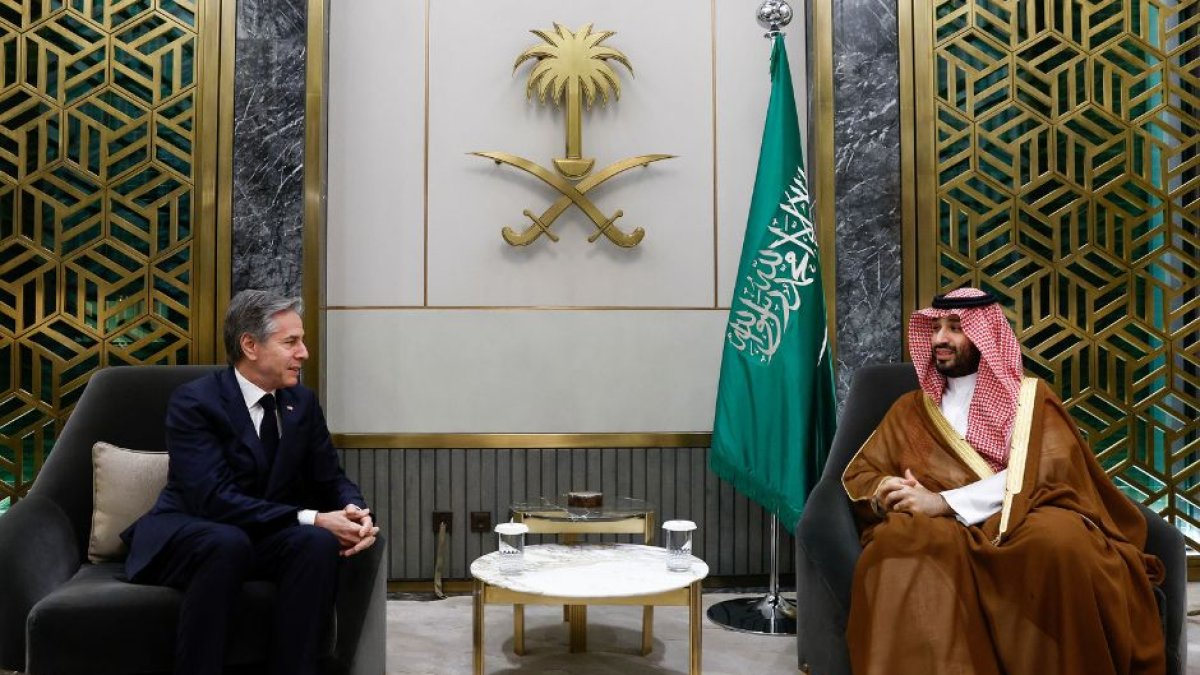The US proposes that Israel recognize a Palestinian state in exchange for an agreement with Saudi Arabia
Although there is a route mapped towards the normalization of relations, the path is treacherous.

El Príncipe Heredero de Arabia Saudita, Mohammed bin Salman (R)
The White House is promoting a historic diplomatic agreement between Saudi Arabia and Israel that could mean the creation of a Palestinian state.
According to the newspaper The Wall Street Journal, the Biden Administration is trying to finalize a long-term agreement in the coming months that will pressure Israeli Prime Minister Benjamin Netanyahu to accept the creation of a Palestinian state in exchange for diplomatic recognition from Saudi Arabia, as revealed by US and Saudi officials.
For Saudi Arabia, the offer to recognize Israel is tempting, as the White House is offering Riyad a more serious defense relationship with Washington, assistance in acquiring civil nuclear energy and the promise of the creation of a Palestinian state.
According to the WSJ, this offer from the White House to Saudi Arabia is already in the final stages of negotiation.
However, although the recognition of Saudi Arabia would be a monumental strategic victory for Israel in this war context, there are various obstacles in the way, one of them being the current opposition within the Israeli country for a two-state solution after the terrorist attacks of October 7.
The WSJ reports that part of Netanyahu's goNetanyahu’salition and the prime minister himself are reluctant to accept the two-state solution, especially at a time when the creation of a Palestinian state could be interpreted as a reward for the Palestinian terrorist group Hamas.
However, although Israel considers that this is not the time for a two-state solution, the agreement is not necessarily at a standstill.
According to the report, although Saudi Arabia's leaders have asserted for decades that a Palestinian state is a priority for peace in the region and also the logical path to normalization of relations with Israel, Saudi officials privately admitted to the United States “that they might accept verbal assurances from Israel that it would engage in new talks on Palestinian statehood to secure the other parts of the deal of more interest to Riyad.”
According to the WSJ, some Saudi officials have said they would view the White House's diplomatic agreement favorably even without the creation of a Palestinian state for the moment, but with the certainty that the United States will provide assistance for the acquisition of civil nuclear energy and also the establishment of more formal relations in the military field.
Likewise, for Israel, recognition of Saudi Arabia is fundamental since it is not only about the normalization of relations with its most powerful neighbor in the region but also about sending a message that would completely change the geopolitical landscape as enemies of the Jewish State try to raise tensions.
However, although there is apparently a route to normalization, the path seems to be packed with landmines.
First, Arab officials believe that a temporary ceasefire in Gaza would make it easier for the Saudis to advance their conclusion for the draft agreement promoted by the United States, but talks to achieve a cessation of fighting in Gaza are currently at a standstill.
Likewise, Israel is also apparently determined to proceed with a ground military operation against Hamas in Rafah, the Gaza city near the border with Egypt where more than a million Palestinians are sheltered from the war against the terrorists.
This operation is viewed negatively in the White House due to the high possibility of collateral damage that could damage Israel's reputation internationally and jeopardize potential agreements.
Therefore, although the interest in the diplomatic agreement is real between the parties, many details are missing before it can be completely finished.

























